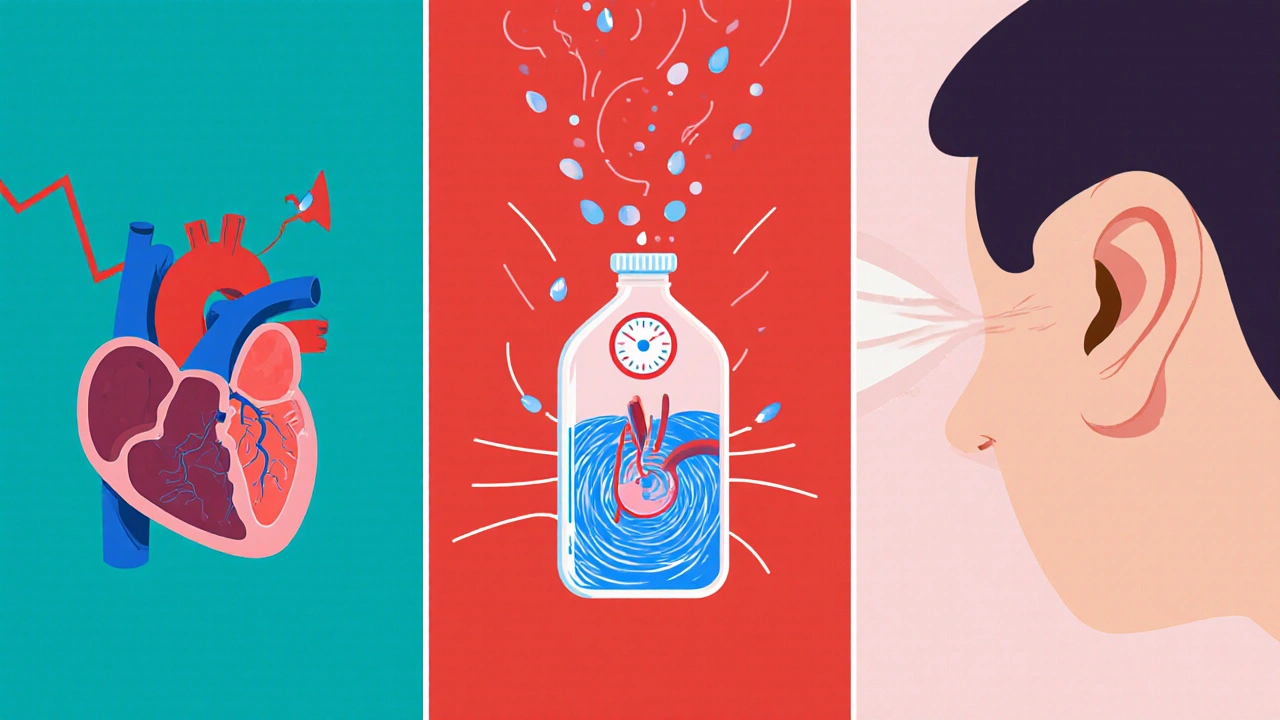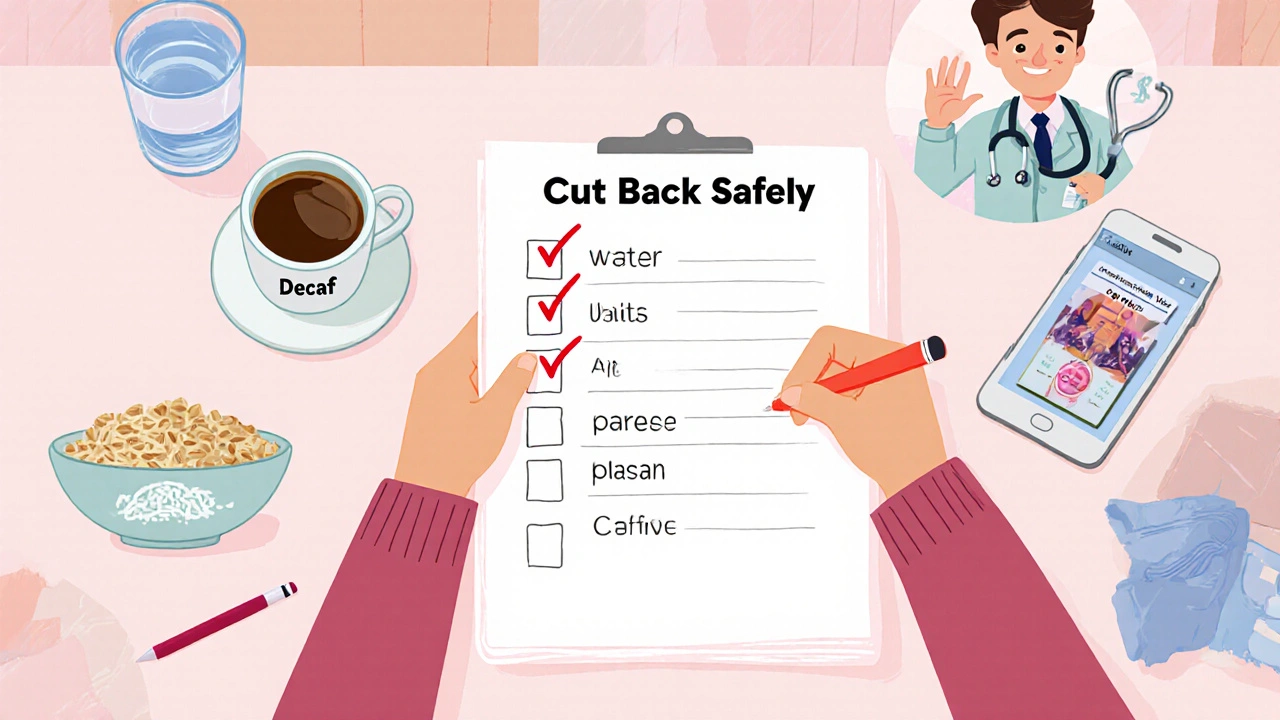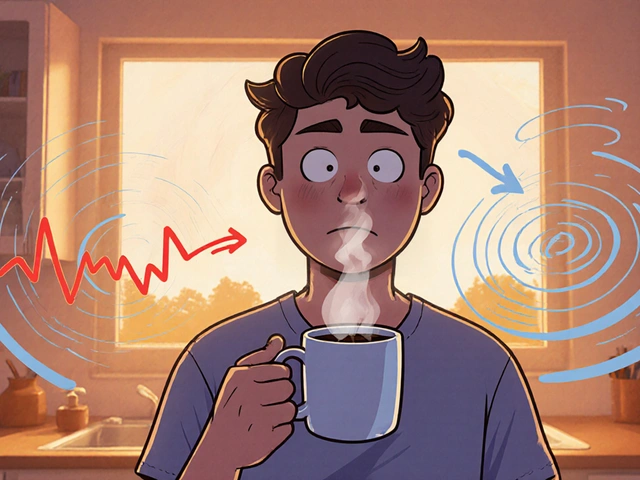Caffeine Dizziness Risk Calculator
Calculate Your Daily Caffeine Intake
Caffeine intake above 200 mg can increase dizziness risk for many people. Enter your daily intake to see your risk level and receive personalized recommendations.
Quick Summary
- Caffeine blocks adenosine, raising heart rate and blood pressure, which can trigger dizziness.
- Genetics, hydration, sleep, and medication use influence how strongly caffeine affects you.
- Cutting back to 200mg or less per day usually eases symptoms for most people.
- Monitor timing, stay hydrated, and pair caffeine with food to reduce spikes.
- Seek medical advice if dizziness persists despite lifestyle changes.
When you sip that morning coffee, the buzz can feel great-until a wave of dizziness hits. Caffeine is a naturally occurring stimulant found in coffee, tea, chocolate, and many soft drinks. It works by blocking adenosine receptors, which normally promote relaxation and sleepiness.
Another key term in this discussion is Dizziness - a sensation of light‑headedness, unsteadiness, or spinning that can arise from many physiological pathways. Understanding how the two interact helps you decide whether to trim your caffeine habit.
How Caffeine Affects the Body
Within minutes of drinking a caffeinated beverage, blood levels of caffeine climb, reaching a peak around 30-60 minutes. The main actions are:
- Adenosine antagonism: By occupying adenosine receptors, caffeine removes the brake on neuronal activity, leading to heightened alertness.
- Sympathetic surge: The brain interprets the lack of adenosine as a stress signal, releasing adrenaline (epinephrine) and norepinephrine. These hormones increase heart rate, constrict peripheral vessels, and raise blood pressure.
- Fluid shift: Caffeine is a mild diuretic; it prompts kidneys to excrete more sodium and water, potentially lowering circulating blood volume.
Each of these mechanisms can, under the right conditions, tip the balance toward dizziness.
Why Dizziness Happens After Caffeine
There are three primary pathways linking caffeine to that woozy feeling:
- Blood‑pressure spikes: A sudden rise in systolic pressure can reduce cerebral perfusion if the brain’s autoregulation can't keep up, especially in people with hypertension.
- Dehydration: The diuretic effect may thin the blood, making the brain more sensitive to positional changes (standing up quickly, for example).
- Inner‑ear fluid changes: Caffeine can alter the composition of endolymph in the vestibular system, heightening the sense of motion.
For most healthy adults, these effects are brief and mild. However, if you already have low blood pressure, anemia, or an overactive vestibular system, the same dose can feel overwhelming.

Who Is Most Vulnerable?
Not everyone reacts the same way. Research from the 2023 Journal of Clinical Neurophysiology shows:
- People with a genetic variation in the CYP1A2 enzyme metabolize caffeine slower, leading to longer exposure and higher dizziness risk.
- Individuals who skip breakfast are 45% more likely to report caffeine‑induced light‑headedness.
- Those taking antihypertensive meds, certain antibiotics (e.g., ciprofloxacin), or migraine preventatives often experience amplified side effects.
Age also matters. Adolescents and older adults tend to have reduced renal clearance, making the diuretic impact more pronounced.
Practical Steps to Cut Back Safely
If you suspect caffeine is behind your dizziness, try the following plan. It’s designed to avoid withdrawal headaches and keep you functional.
- Track intake: Write down every caffeinated beverage, including size and caffeine estimate (e.g., 8oz brewed coffee ≈ 95mg).
- Set a target: Aim for ≤200mg per day (about two small coffees). Adjust downwards if symptoms persist.
- Gradual reduction: Replace 25% of your daily caffeine with decaf or herbal tea each week. For example, swap one 8‑oz coffee for an 8‑oz half‑caffeinated blend.
- Hydrate: Drink at least 2L of water daily. Adding a pinch of salt or an electrolyte tablet can offset the diuretic effect.
- Eat before caffeine: Consuming protein or complex carbs slows absorption, smoothing the blood‑pressure rise.
- Mind timing: Avoid caffeine after 2PM to prevent sleep disruption, which itself can cause dizziness.
Most people notice a reduction in wobbliness within a week of reaching the 200mg threshold.
When to Seek Professional Help
If dizziness continues despite cutting back, consider these red flags:
- Fainting or loss of consciousness.
- Chest pain, irregular heartbeat, or shortness of breath.
- Persistent vertigo that lasts more than a few minutes.
- Neurological symptoms such as double vision or numbness.
These could signal underlying conditions-arrhythmias, inner‑ear disorders, or anemia-that need medical evaluation.

Comparison Table: Caffeine Dose vs. Dizziness Risk
| Daily Caffeine (mg) | Common Sources | Typical Blood‑Pressure Change | Dizziness Likelihood |
|---|---|---|---|
| 0-50 | Decaf coffee, herbal tea | 0-2mmHg | Very low |
| 51-150 | One 8‑oz cup coffee, 2 cans cola | 3-8mmHg | Low to moderate (depends on sensitivity) |
| 151-300 | Two 8‑oz coffees, energy drink | 9-15mmHg | Moderate to high for vulnerable groups |
| 301+ | Multiple coffees, strong espresso, large energy drinks | >15mmHg | High; often triggers dizziness, especially if dehydrated |
Bottom Line
If you regularly feel light‑headed after your favorite brew, the link between caffeine dizziness is more than anecdotal. By monitoring intake, staying hydrated, and pairing caffeine with food, most people can keep the buzz without the wobble. Persistent symptoms warrant a check‑up, because the underlying cause might be something other than caffeine.
Frequently Asked Questions
Can decaf coffee still cause dizziness?
Decaf contains a small amount of caffeine (typically 2-5mg per cup). For most people it’s too low to affect blood pressure, but if you’re extremely sensitive, even that trace can tip you over.
Is the diuretic effect of caffeine strong enough to dehydrate me?
Caffeine increases urine output by about 10% per 100mg consumed. If you drink plenty of water alongside your coffee, the net fluid loss is minimal. Problems arise when you replace water with caffeine and neglect hydration.
Do energy drinks cause more dizziness than coffee?
Energy drinks often combine caffeine with sugar, taurine, and other stimulants. The combined effect can amplify heart‑rate spikes, making dizziness more common than with plain coffee at equivalent caffeine levels.
How long does caffeine stay in the system?
The average half‑life is 5-6hours, but it ranges from 3hours in smokers to 9hours in pregnant women. This variance explains why some feel dizzy late in the day while others don’t.
Should I stop caffeine completely if I have migraines?
Many migraine sufferers find even modest caffeine can trigger attacks. Try a low‑caffeine diet (under 100mg/day) for a month; if migraines improve, a gradual cut‑back may be the answer.


Nis Hansen
October 17, 2025 AT 19:43Caffeine is more than a morning perk; it is a chemical key that unlocks the brain’s alert circuits. When it binds to adenosine receptors, it removes the natural brake on neuronal firing, ushering in a cascade of physiological changes. One of those changes is a sympathetic surge that raises heart rate and blood pressure, occasionally tipping the delicate balance that maintains cerebral perfusion. If the vascular system cannot adapt quickly enough, the brain may receive a brief deficit of oxygen, manifesting as light‑headedness. Moreover, caffeine’s mild diuretic effect can thin the plasma volume, further challenging the body’s ability to keep you steady on your feet.
Genetic variations in the CYP1A2 enzyme mean that some people metabolize caffeine slowly, extending its impact and increasing the risk of dizziness. Lifestyle factors-such as skipping breakfast, dehydration, or lack of sleep-amplify those effects, turning a modest cup of joe into a wobble‑inducing experience.
The good news is that the body is adaptable, and small, intentional changes can restore equilibrium. Start by tracking every caffeinated beverage you consume, noting size and estimated milligrams of caffeine. Set a realistic target, such as 200 mg per day, and reduce your intake gradually to avoid withdrawal headaches. Replacing a quarter of your coffee with decaf or herbal tea each week allows the nervous system to adjust without a shock. Hydration is essential; aim for at least two liters of water daily, perhaps supplemented with electrolytes to counteract diuresis. Consuming protein or complex carbohydrates before coffee slows absorption, smoothing out the blood‑pressure spike. And be mindful of timing-avoid caffeine after mid‑afternoon to protect sleep quality, which in itself can cause dizziness.
If symptoms persist despite these adjustments, seek medical evaluation to rule out underlying conditions such as anemia or vestibular disorders. Remember, the goal is not to eliminate pleasure but to harmonize enjoyment with well‑being. By applying these principles, you can keep the buzz without the wobble, and your body will thank you.
Fabian Märkl
October 17, 2025 AT 20:46Cutting back doesn’t have to feel like a punishment-it can be a chance to explore new flavors! ☕️🍵 Try swapping half of your usual brew for a tasty herbal tea and notice how steadier you feel. Staying hydrated alongside your caffeine can make a huge difference, so keep a water bottle handy. You’ve got this, and the world will still be bright without the dizzy swirl. 😊
Grace Hada
October 17, 2025 AT 21:48Your reduction plan oversimplifies the neurovascular intricacies, ignoring real risk factors.
alex montana
October 17, 2025 AT 22:50But!!! it’s not just about numbers??!! the brain reacts!! and you can't just dismiss!!! the pressure spikes- they matter??
Lyle Mills
October 17, 2025 AT 23:53From a hemodynamic perspective caffeine induces a transient increase in systolic arterial pressure which can compromise cerebrovascular autoregulation. The resultant shear stress on endothelial cells may trigger baroreflex‑mediated adjustments that occasionally manifest as vertigo. Additionally the osmotic shift due to diuresis reduces plasma oncotic pressure affecting perfusion gradients. In patients with pre‑existing autonomic dysfunction these mechanisms are amplified. Therefore monitoring load and ensuring euvolemia are key.
Barbara Grzegorzewska
October 18, 2025 AT 00:56Honestly this is sooo overcomplicated like reading a sci‑fi novel in Latin. Coffee is just coffee lol. Stop turning a simple cuppa into a drama fest ya know?
kendra mukhia
October 18, 2025 AT 02:00Behold the trembling soul, ensnared by the siren call of caffeine, teetering on the edge of vertigo! The rush of alertness feels like a fleeting triumph, yet the subsequent wobble betrays a hidden fragility. Every sip becomes a gamble between clarity and disorientation, a dance with invisible forces. When the world starts to spin, the mind frantically seeks balance, pleading for a reprieve. Only by mastering the dose can one claim dominion over this volatile partnership.
Bethany Torkelson
October 18, 2025 AT 03:03I demand you stop glorifying the wobble and start taking responsibility for your own health!
Wyatt Schwindt
October 18, 2025 AT 04:06Monitoring caffeine intake is a prudent step toward maintaining balance.
Avril Harrison
October 18, 2025 AT 05:10Sounds like a solid plan, mate-just keep a water bottle nearby and enjoy the process.
Natala Storczyk
October 18, 2025 AT 06:13Wow!!! Who would dare ignore the thunderous warnings of the body??? The very act of sipping coffee becomes a battlefield!!! Every tremor is a cry for rescue!!! Let the nation rise, reject the tyranny of caffeine, and reclaim equilibrium!!!
nitish sharma
October 18, 2025 AT 07:16I recommend a structured reduction protocol: first, document daily intake; second, replace a quarter of each caffeinated beverage with a non‑caffeinated alternative; third, increase water consumption to maintain plasma volume; and finally, reassess symptoms after each weekly adjustment. This methodical approach aligns with best clinical practices and supports sustainable habit change.